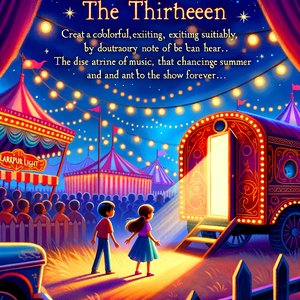The Thirteenth Wagon

The Larkspur Light Circus arrived at the old fairgrounds the way fog rolls in—soft and sudden, until the whole field smelled like oranges and fresh sawdust and everything felt a little enchanted. By afternoon, the big top was up, blue as midnight, with a crown of gold stars stitched near the highest seam. Ropes stretched from the tent like harp strings, humming in the breeze. A painted calliope puffed steam and played a bright tune that skipped here and there like a stone across a pond.
‘The calliope always sounds a little crooked on the first day,’ Theo said, pushing his glasses up on his nose. My cousin had a way of sounding like someone’s grandfather even when he was only twelve. He’d read the poster three times already. I’d memorised it without trying: Larkspur Light Circus, for two nights only. Wonders of silk, light, and sound. No animals, no cages, no limits.
But the calliope wasn’t just crooked. Beneath its tumbling chimes and cheerful clangs, I heard something small and bright hiding in the music, like a coin dropped into a deep well. It flickered at the edges of my hearing—a very high, thin whistle that made the hairs on my arms lift.
‘Do you hear that?’ I asked.
‘Hear what?’ Theo tilted his head towards the tune. ‘Just the oom-pah stuff. And probably my stomach.’ He shook the paper cone of sugared almonds we’d been sharing. Empty.
‘Not that.’ I tried to catch the sound, to pin it down. It slid away and then slipped back, tugging at me like a thread. ‘Never mind.’
Before I could decide whether to follow it or tell myself I was imagining things, a woman in a night-blue tailcoat appeared at the mouth of the big top. She wore a top hat with a narrow silver star pinned above the brim and boots that sparkled like the inside of a geode. When she saluted us, the star on her hat winked, as if it knew a secret and was trying not to laugh.
‘Welcome,’ she called, her voice warm enough to melt a stubborn frost. ‘I am Maestra Vesper Vale. Hold on to your hats, hearts, and all your better manners.’ She tipped her hat to the crowd, and to me. No, not to me—to everyone. Probably. But it felt like the star on her hat looked right at me and then away, as if checking a list only she could see.
By the time the lanterns around the tent blinked on, the sky had turned a deep blue I always think of as blueberry pie before it cools. We found seats near the ring, not too close to where a stray ribbon might wrap around your ankle by accident, but close enough to smell the sawdust and the spun sugar and the faint tang of something metallic and clean. The benches creaked as people settled. The entire town felt squeezed into the circles of light—the librarian with her hair in a swoop, the pair of twins who ran like they were very late to every place they’d ever been, three fishermen still wearing their boots.
The lights lowered. Maestra Vale strode into the ring, her cane tapping a crisp rhythm. She snapped her fingers and the dust in the air became a galaxy of glittering flecks. ‘Good evening, Harbor’s Edge,’ she said. ‘Tonight, we will juggle light, fold time, and show you the places where big dreams begin.’
The show unfurled. A juggler in a suit the colour of rain tossed glass moons that never broke no matter how they skimmed each other’s edges. An acrobat named Lark (and her partner, Wren) climbed a silk rope that poured down like a waterfall, then seemed to walk up it like a spiral staircase that existed only because they believed it did. The Laughing Cyclist pedalled a hat rack around the ring; every time he passed a hook, a different hat leaped onto his head, each one sillier than the last.
Between acts, lights swooped overhead like tame comets. The calliope kept up its cheerful song in the corner of the tent, and every so often, that other sound slid underneath it, the high note like a silver thread. It slithered behind my teeth and into the bones around my ears. I nudged Theo.
‘Still nothing?’ I whispered.
He shook his head, but his eyes were wide behind the glasses. ‘I mean, there’s a tiny squeak when the calliope player hits that spring-loaded thing, but—’
Another act interrupted him: mirrors carried in like polished doors, angled and set so an entire ocean seemed to flood the tent—a sea made of light and smoke, complete with shadows of whales that passed overhead, rippling across faces and hands. The crowd ooohed. Someone dropped a candy and it rolled under the bench; a toddler announced that she would like to make friends with a whale immediately.
‘The posters didn’t mention whales,’ Theo whispered. ‘Rude.’
I was about to agree when something tucked into my programme prickled my fingers. I slipped it into my lap. It was a small ticket I hadn’t seen when I’d folded the programme a hundred times earlier, the paper stiff and cool as a coin. My name was scratched into it—not printed, but etched in a narrow hand—Mira—above a tiny number stamped in the corner: 13. I swallowed. Theo’s eyes dropped to my hands. He blinked, startled. Without a word, I lifted the edge of the programme and saw that he had one too, his name etched just as neatly, the same number in the corner.
Maestra Vale’s cane tapped in the ring, softly, a sound that somehow beat time in my chest. She raised her chin as if listening. The calliope hiccuped, then played on.
On the back of my ticket, a few more words glinted in dappled silver: *When the bells ring, follow the high note. No time to dawdle.*
Theo read them upside down. ‘That’s… weird, right? That’s weird. Are we in trouble?’
‘I don’t know.’ But I did know that we had not told a single person we were coming to the circus, because everyone we might have told was also at the circus, already here under the tent. And I knew that this felt less like trouble and more like standing at the edge of a creek with a rope swing and your friend saying, *I dare you.*
The second half of the show whirled faster, as if someone had turned up the speed on a spinning top. I let the acts wash over me. The Contortionist folded herself into a hatbox, then unfolded as a flock of paper ravens took wing, black as spilled ink. A troupe of mimes called the Quiet Quills turned invisible ropes into a cat’s cradle that held the ringmaster suspended one inch above the sawdust while she told the story of how light travels, her voice steady, her boots floating.
And all the while, that high note came and went, sometimes so faint I thought I’d imagined it and sometimes strong enough that it made the tiny muscles near my jaw jump.
The town clock began to ring the hour. *Count them,* I thought automatically. *One. Two. Three—*
‘Four,’ Theo mouthed.
The high note threaded itself between the clangs, urging, urgent, quicksilver. When it reached nine, the crowd burst into a shower of applause for a rain of confetti that released from the ceiling like a cloud breaking everywhere at once. That was when I stood.
‘Now?’ Theo said, eyebrows pouncing towards his hairline.
I held up my ticket. ‘Now.’
We slid sideways along the bench—‘Excuse us, sorry, pardon me, excuse me’—and ducked under the canvas flap at the back of the tent, into air that felt cooler and smelled like damp rope and something citrusy. Behind the big top, the circus turned practical: guy wires stitched the tent to the earth, wagons with painted sides huddled in rows, each one labelled—Wardrobe, Mirrors, Calliope, Props, Sewing. Lanterns swung from hooks and made all the shadows sway as if they were part of an act too.
The high note was clearer here. It didn’t hurt, but it was sharp. It drew a line in the air that I could follow the way you follow the line your finger leaves on a fogged-up window. Theo kept up without asking why we were walking towards the narrow space between the Mirrors wagon and one with moths painted in silver filigree across its panels. The moths looked like they were trying to fly out of the paint.
On the moth wagon’s door, a tiny brass plaque had been screwed on slightly crooked. There was no number on it, only a punched circle like a little listening ear. A clockwork moth—a real one—rested on the step. Its wings were thin as paper; gears showed through its body like a skeleton of brass. It twitched, then lifted, buzzed around our heads in a small, eager spiral, and landed on the plaque with a polite *tink.* The high note sharpened, bright as sunlight splitting on glass.
We didn’t knock. We didn’t have to. The latch clicked and the door gave.
Inside, the wagon smelled like cedar shavings and oranges and the cool side of a pillow. Shelves lined both walls, crowded with boxes and jars labelled in neat handwriting: Spare Moons, Extra Echoes, False Doors, Mirror Glue. A row of whistles hung from a velvet ribbon, each shaped a little different—from a slender reed to a fat little bulb the size of a plum. On a workbench lay a ledger with a fountain pen uncapped and a splotch of ink drying in a bloom. The ledger was open to a page that read: *Keeper of the High Note—Candidates.*
Below that, in the same hand as on the tickets: *Mira. Theo.*
‘Okay,’ Theo said, because it seemed like someone should say something. ‘This is exactly the kind of place Aunt Zadie tells us not to go into. Strange wagons. Unattended ink.’
‘And yet,’ I said, because humour sometimes feels like the only rope you can grab when the ground starts to tilt, ‘here we are.’
There was another thing, too: a circle painted on the floorboards in a colour that might have once been orange but had been scuffed and softened by feet and time. In the circle, in careful numbers, someone had painted: 13. The paint had flaked where many hands had lifted the small iron ring set into the centre of the circle.
The high note was gentler now, the way someone hums against your shoulder to say, *It’s all right.* The clockwork moth landed on the iron ring and clicked its wings together once, twice, like a signal. Then it whirred down through a crack I hadn’t seen, as if the floor itself took a little breath and parted to let it pass. The iron ring looked like a handle. The circle looked like a door.
Theo crouched and pressed his ear to the painted number. ‘Is that… wind?’ he asked.
I knelt beside him. Against the floor, my cheek cooled. Through the wood, I heard more than wind: a hush of voices, the hush of an audience when a performer climbs to the top of the ladder and the whole tent holds its breath. I hooked two fingers through the iron ring. It was heavy and warm, as if a hand had just left it. The bell of the town clock finished its ninth chime and settled into silence.
‘I don’t think we should,’ Theo said, but it sounded like he was talking to himself.
‘Me neither,’ I said, and lifted.
The trapdoor opened on a square of warm darkness. The scent that rose wasn’t scary at all. It smelled like sugar smoke and rain and something green, like crushed mint. A wooden ladder dropped into the space, its rungs polished smooth in the middle, as if many feet had used it and never once missed. From below, a small light turned and caught, like a lantern being raised around a corner.
‘About time,’ said a voice from somewhere under the wagon. It wasn’t loud, but it curled around each of my ribs.
Theo’s eyes leaped to mine. ‘Nope,’ he said faintly. ‘No, thank you.’ But he didn’t move away.
The wagon creaked. Somewhere outside, a pair of performers laughed and sprinted past, trailing the smell of make-up and something that glittered. Far away, the crowd roared and then hushed, as if the show had slipped into another act without us. The high note trembled along the ladder, turning the wood into a tiny tuning fork beneath my hand.
Maestra Vesper Vale’s shadow slid across the open door on the far side of the wagon like a cloud crossing the sun. The cane tapped twice on the step. *Tap. Tap.*
‘You heard it, then,’ she said from the doorway, her hat brim hiding her eyes. ‘Not everyone does.’
I looked up, my hand still on the ladder. ‘What is—’
She lifted a finger, not unkind. ‘Careful, Mira. Questions have a way of turning into invitations.’ She tipped her head towards the circle. ‘There are two paths, and you have to pick quickly. Down the ladder, you’ll see things we can’t unshow you. Back out that door, and the sound you’re hearing will become the sort of thing you barely remember once you’ve grown up a little more.’
‘That sounds like a threat,’ Theo said.
Maestra Vale’s mouth bent, amused at the edge. ‘Only a promise. Every good show needs one.’
From below, the light moved again, a hush of cloth and a clink as if a cup met a saucer. The high note unfurled, a ribbon of sound that looped around my wrist. Somewhere in the dark beneath, something shifted on the ladder, a weight that made the rungs whisper against their brass brackets.
‘Don’t dawdle,’ said the voice below, closer now. It said my name the way grown-ups say it when they see you on the bus after a long time and you’ve got taller. ‘Mira. Theo. The thirteenth wagon doesn’t wait.’
All at once, I became aware of a hundred tiny things: the scrape of Theo’s sneaker on wood, the painted wings of a moth catching a breeze from a door that wasn’t open yet, the prim neatness of the ledger ink as it dried into a forever loop of the letter *M.* Outside, a string of pennants clicked against their line like teeth.
Theo’s hand found the back of my shirt and held for exactly one second before letting go. He wasn’t pushing. He wasn’t pulling. Just finding out where I was in the kind of dark you get to choose.
The lantern below lifted higher, casting a rippling light up the ladder. It struck the underside of the trapdoor and slid across my knuckles, bright as a slice of daybreak. That was when the ladder tugged, not much, just enough to make the rungs thrum.
Something—or someone—had begun to climb up towards us.
Autor zakończenia:

 English
English
 polski
polski
 Co było dalej?
Co było dalej?



